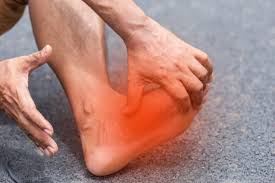Numbness in the extremities, such as the legs and feet, can be an unsettling experience, often leading to discomfort and distress. Understanding the causes and exploring effective treatments can help alleviate this condition. This article delves into the various causes and remedies for numbness, particularly in the legs and feet, and offers guidance on selecting appropriate footwear to mitigate symptoms.
Numbness in the extremities can manifest in various ways, from a tingling sensation to complete loss of feeling. It may occur in the left or right leg, the feet, or even just one foot, and it can be a symptom of several underlying conditions.
 Common Causes of Numbness
Common Causes of Numbness
The causes of numbness are diverse, ranging from temporary issues like poor posture to chronic conditions such as diabetic neuropathy. Here are some common causes:
-
Poor Circulation: Reduced blood flow can cause numbness, especially if you've been sitting or standing in one position for a long time.
-
Nerve Compression: Conditions like sciatica can lead to nerve compression, resulting in numbness, particularly in the legs.
-
Diabetes: High blood sugar levels can damage nerves, leading to diabetic neuropathy, which often causes numbness in the feet.
-
Vitamin Deficiency: Lack of vitamins, particularly B12, can affect nerve health and lead to numbness.
-
Injury: Trauma to nerves from injuries can cause numbness in the affected area.
Home Remedies for Numbness
While medical intervention is crucial for chronic conditions, several home remedies can help alleviate numbness in the legs and feet.
 Improving Circulation
Improving Circulation
Enhancing blood flow to your extremities can reduce numbness. Here are a few ways to improve circulation:
-
Regular Exercise: Activities like walking, cycling, or swimming can increase blood flow and reduce numbness.
-
Stretching: Gentle stretching of the legs and feet can relieve nerve compression and improve circulation.
-
Massage: Massaging the affected area can stimulate blood flow and reduce symptoms.
Dietary Adjustments
A balanced diet rich in essential nutrients can support nerve health and reduce numbness.
-
Vitamin B12: Ensure adequate intake of B12, found in foods like fish, meat, and dairy, to prevent deficiency-related numbness.
-
Magnesium: Foods high in magnesium, such as nuts and seeds, can improve nerve function.
-
Hydration: Staying well-hydrated supports overall health and can help alleviate symptoms of numbness.
Lifestyle Changes
Incorporating certain lifestyle changes can also help manage numbness.
-
Elevate Your Legs: Elevating your legs can reduce swelling and improve circulation.
-
Avoid Tight Clothing: Loose-fitting clothes prevent restriction of blood flow and nerve compression.
-
Quit Smoking: Smoking affects circulation and can exacerbate numbness.
Footwear for Neuropathy and Numbness
Choosing the right footwear is crucial for individuals experiencing numbness, particularly if caused by diabetic neuropathy or other chronic conditions.
Features of Ideal Footwear
When selecting shoes, consider the following features to ensure comfort and support:
-
Arch Support: Proper arch support helps distribute weight evenly and reduces pressure on nerves.
-
Cushioned Soles: Cushioned soles can absorb shock and reduce stress on the feet.
-
Wide Toe Box: A wide toe box prevents crowding and allows for natural movement of the toes.
-
Adjustable Straps: Shoes with adjustable straps or laces provide a customised fit and prevent slipping.
Diabetic Footwear
Diabetic shoes are specially designed to protect the feet and reduce the risk of complications associated with neuropathy.
-
Seamless Interiors: Diabetic shoes often feature seamless interiors to prevent friction and blisters.
-
Extra Depth: Extra depth accommodates custom orthotics, providing additional support.
-
Breathable Materials: Breathable materials keep feet dry and reduce the risk of infections.
Medical Treatments and Interventions
For persistent or severe numbness, medical intervention may be necessary. It's important to consult a healthcare provider for a proper diagnosis and treatment plan.
Medications
Certain medications can help manage the symptoms of numbness, particularly if caused by underlying conditions like diabetes.
-
Pain Relievers: Over-the-counter pain relievers can reduce discomfort associated with numbness.
-
Antidepressants: Some antidepressants are effective in treating nerve pain and associated numbness.
-
Anticonvulsants: Medications like gabapentin can help manage nerve pain.
Physical Therapy
Physical therapy can be an effective treatment for numbness, particularly if caused by nerve compression or injury.
-
Strengthening Exercises: Exercises to strengthen muscles can relieve pressure on nerves.
-
Manual Therapy: Techniques like massage and manipulation can improve circulation and reduce symptoms.
Surgical Interventions
In severe cases, surgical intervention may be required to relieve nerve compression or repair damaged nerves.
-
Decompression Surgery: This procedure relieves pressure on nerves, alleviating numbness.
-
Nerve Repair Surgery: In cases of nerve damage, surgery may be performed to repair or graft nerves.
When to Seek Medical Attention
While many cases of numbness can be managed with home remedies and lifestyle changes, it's important to seek medical attention if:
-
Numbness is persistent or worsening.
-
You experience numbness in conjunction with other symptoms like weakness or difficulty walking.
-
You have a known condition like diabetes that could be affecting nerve health.
Conclusion
Numbness in the extremities can be a frustrating and uncomfortable experience. By understanding the causes and exploring various treatments, you can find relief and improve your quality of life. Whether it's through home remedies, appropriate footwear, or medical interventions, there are numerous options to address numbness and promote overall nerve health. Always consult with a healthcare provider for a personalised treatment plan that suits your specific needs.








